- Home
- William Golding
Lord of the Flies Page 9
Lord of the Flies Read online
Page 9
"And what about the beast?"
Something strange was happening to Percival. He yawned and staggered, so that Jack seized and shook him.
"Where does the beast live?"
Percival sagged in Jack's grip.
"That's a clever beast," said Piggy, jeering, "if it can hide on this island."
"Jack's been everywhere―"
"Where could a beast live?"
"Beast my foot!"
Percival muttered something and the assembly laughed again. Ralph leaned forward.
"What does he say?"
Jack listened to Percival's answer and then let go of him. Percival, released, surrounded by the comfortable presence of humans, fell in the long grass and went to sleep.
Jack cleared his throat, then reported casually.
"He says the beast comes out of the sea."
The last laugh died away. Ralph turned involuntarily, a black, humped figure against the lagoon. The assembly looked with him, considered the vast stretches of water, the high sea beyond, unknown indigo of infinite possibility, heard silently the sough and whisper from the reef.
Maurice spoke, so loudly that they jumped.
"Daddy said they haven't found all the animals in the sea yet."
Argument started again. Ralph held out the glimmering conch and Maurice took it obediently. The meeting subsided.
"I mean when Jack says you can be frightened because people are frightened anyway that's all right. But when he says there's only pigs on this island I expect he's right but he doesn't know, not really, not certainly I mean―" Maurice took a breath. "My daddy says there's things, what d'you call'em that make ink―squids―that are hundreds of yards long and eat whales whole." He paused again and laughed gaily. "I don't believe in the beast of course. As Piggy says, life's scientific, but we don't know, do we? Not certainly, I mean―"
Someone shouted.
"A squid couldn't come up out of the water!"
"Could!"
"Couldn't!"
In a moment the platform was full of arguing, gesticulating shadows. To Ralph, seated, this seemed the breaking up of sanity. Fear, beasts, no general agreement that the fire was all-important: and when one tried to get the thing straight the argument sheered off, bringing up fresh, unpleasant matter.
He could see a whiteness in the gloom near him so he grabbed it from Maurice and blew as loudly as he could. The assembly was shocked into silence. Simon was close to him, laying hands on the conch. Simon felt a perilous necessity to speak; but to speak in assembly was a terrible thing to him.
"Maybe," he said hesitantly, "maybe there is a beast."
The assembly cried out savagely and Ralph stood up in amazement.
"You, Simon? You believe in this?"
"I don't know," said Simon. His heartbeats were choking him. "But...."
The storm broke.
"Sit down!"
"Shut up!"
"Take the conch!"
"Sod you!"
"Shut up!"
Ralph shouted.
"Hear him! He's got the conch!"
"What I mean is... maybe it's only us."
"Nuts!"
That was from Piggy, shocked out of decorum. Simon went on.
"We could be sort of...."
Simon became inarticulate in his effort to express mankind's essential illness. Inspiration came to him.
"What's the dirtiest thing there is?"
As an answer Jack dropped into the uncomprehending silence that followed it the one crude expressive syllable. Release was immense. Those littluns who had climbed back on the twister fell off again and did not mind. The hunters were screaming with delight.
Simon's effort fell about him in ruins; the laughter beat him cruelly and he shrank away defenseless to his seat.
At last the assembly was silent again. Someone spoke out of turn.
"Maybe he means it's some sort of ghost."
Ralph lifted the conch and peered into the gloom. The lightest thing was the pale beach. Surely the littluns were nearer? Yes―there was no doubt about it, they were huddled into a tight knot of bodies in the central grass. A flurry of wind made the palms talk and the noise seemed very loud now that darkness and silence made it so noticeable. Two grey trunks rubbed each other with an evil speaking that no one had noticed by day.
Piggy took the conch out of his hands. His voice was indignant.
"I don't believe in no ghosts―ever!"
Jack was up too, unaccountably angry.
"Who cares what you believe―Fatty!"
"I got the conch!"
There was the sound of a brief tussle and the conch moved to and fro.
"You gimme the conch back!"
Ralph pushed between them and got a thump on the chest. He wrestled the conch from someone and sat down breathlessly.
"There's too much talk about ghosts. We ought to have left all this for daylight."
A hushed and anonymous voice broke in.
"Perhaps that's what the beast is―a ghost."
The assembly was shaken as by a wind.
"There's too much talking out of turn," Ralph said, "because we can't have proper assemblies if you don't stick to the rules."
He stopped again. The careful plan of this assembly had broken down.
"What d'you want me to say then? I was wrong to call this assembly so late. We'll have a vote on them; on ghosts I mean; and then go to the shelters because we're all tired. No―Jack is it?―wait a minute. I'll say here and now that I don't believe in ghosts. Or I don't think I do. But I don't like the thought of them. Not now that is, in the dark. But we were going to decide what's what."
He raised the conch for a moment.
"Very well then. I suppose what's what is whether there are ghosts or not―"
He thought for a moment, formulating the question.
"Who thinks there may be ghosts?"
For a long time there was silence and no apparent movement. Then Ralph peered into the gloom and made out the hands. He spoke flatly.
"I see."
The world, that understandable and lawful world, was slipping away. Once there was this and that; and now― and the ship had gone.
The conch was snatched from his hands and Piggy's voice shrilled.
"I didn't vote for no ghosts!"
He whirled round on the assembly.
"Remember that, all of you!"
They heard him stamp.
"What are we? Humans? Or animals? Or savages? What's grownups going to think? Going off―hunting pigs―letting fires out―and now!"
A shadow fronted him tempestuously.
"You shut up, you fat slug!"
There was a moment's struggle and the glimmering conch jigged up and down. Ralph leapt to his feet.
"Jack! Jack! You haven't got the conch! Let him speak."
Jack's face swam near him.
"And you shut up! Who are you, anyway? Sitting there telling people what to do. You can't hunt, you can't sing―"
"I'm chief. I was chosen."
"Why should choosing make any difference? Just giving orders that don't make any sense―"
"Piggy's got the conch."
"That's right―favor Piggy as you always do―"
"Jack!"
Jack's voice sounded in bitter mimicry.
"Jack! Jack!"
"The rules!" shouted Ralph. "You're breaking the rules!"
"Who cares?"
Ralph summoned his wits.
"Because the rules are the only thing we've got!"
But Jack was shouting against him.
"Bollocks to the rules! We're strong―we hunt! If there's a beast, we'll hunt it down! We'll close in and beat and beat and beat―!"
He gave a wild whoop and leapt down to the pale sand. At once the platform was full of noise and excitement, scramblings, screams and laughter. The assembly shredded away and became a discursive and random scatter from the palms to the water and away along the beach, beyond night-sig
ht. Ralph found his cheek touching the conch and took it from Piggy.
"What's grownups going to say?" cried Piggy again. "Look at 'em!"
The sound of mock hunting, hysterical laughter and real terror came from the beach.
"Blow the conch, Ralph."
Piggy was so close that Ralph could see the glint of his one glass.
"There's the fire. Can't they see?"
"You got to be tough now. Make 'em do what you want."
Ralph answered in the cautious voice of one who rehearses a theorem.
"If I blow the conch and they don't come back; then we've had it. We shan't keep the fire going. We'll be like animals. We'll never be rescued."
"If you don't blow, we'll soon be animals anyway. I can't see what they're doing but I can hear."
The dispersed figures had come together on the sand and were a dense black mass that revolved. They were chanting something and littluns that had had enough were staggering away, howling. Ralph raised the conch to his lips and then lowered it.
"The trouble is: Are there ghosts, Piggy? Or beasts?"
"Course there aren't."
"Why not?"
"'Cos things wouldn't make sense. Houses an' streets, an'―TV―they wouldn't work."
The dancing, chanting boys had worked themselves away till their sound was nothing but a wordless rhythm.
"But s'pose they don't make sense? Not here, on this island? Supposing things are watching us and waiting?"
Ralph shuddered violently and moved closer to Piggy, so that they bumped frighteningly.
"You stop talking like that! We got enough trouble, Ralph, an' I've had as much as I can stand. If there is ghosts―'
"I ought to give up being chief. Hear 'em."
"Oh lord! Oh no!"
Piggy gripped Ralph's arm.
"If Jack was chief he'd have all hunting and no fire. We'd be here till we died."
His voice ran up to a squeak.
"Who's that sitting there?"
"Me. Simon."
"Fat lot of good we are," said Ralph. "Three blind mice. I'll give up."
"If you give up," said Piggy, in an appalled whisper, "what 'ud happen to me?"
"Nothing."
"He hates me. I dunno why. If he could do what he wanted―you're all right, he respects you. Besides―you'd hit him."
"You were having a nice fight with him just now."
"I had the conch," said Piggy simply. "I had a right to speak."
Simon stirred in the dark.
"Go on being chief."
"You shut up, young Simon! Why couldn't you say there wasn't a beast?"
"I'm scared of him," said Piggy, "and that's why I know him. If you're scared of someone you hate him but you can't stop thinking about him. You kid yourself he's all right really, an' then when you see him again; it's like asthma an' you can't breathe. I tell you what. He hates you too, Ralph―"
"Me? Why me?"
"I dunno. You got him over the fire; an' you're chief an' he isn't."
"But he's, he's, Jack Merridew!"
"I been in bed so much I done some thinking. I know about people. I know about me. And him. He can't hurt you: but if you stand out of the way he'd hurt the next thing. And that's me."
"Piggy's right, Ralph. There's you and Jack. Go on being chief."
"We're all drifting and things are going rotten. At home there was always a grownup. Please, sir, please, miss; and then you got an answer. How I wish!"
"I wish my auntie was here."
"I wish my father... Oh, what's the use?"
"Keep the fire going."
The dance was over and the hunters were going back to the shelters.
"Grownups know things," said Piggy. "They ain't afraid of the dark. They'd meet and have tea and discuss. Then things 'ud be all right―"
"They wouldn't set fire to the island. Or lose―"
"They'd build a ship―"
The three boys stood in the darkness, striving unsuccessfully to convey the majesty of adult life.
"They wouldn't quarrel―"
"Or break my specs―"
"Or talk about a beast―"
"If only they could get a message to us," cried Ralph desperately. "If only they could send us something grownup... a sign or something."
A thin wail out of the darkness chilled them and set them grabbing for each other. Then the wail rose, remote and unearthly,' and turned to an inarticulate gibbering. Percival Wemys Madison, of the Vicarage, Harcourt St. Anthony, lying in the long grass, was living through circumstances in which the incantation of his address was powerless to help him.
CHAPTER SIX
Beast from Air
There was no light left save that of the stars. When they had understood what made this ghostly noise and Percival was quiet again, Ralph and Simon picked him up unhandily and carried him to a shelter. Piggy hung about near for all his brave words, and the three bigger boys went together to the next shelter. They lay restlessly and noisily among the dry leaves, watching the patch of stars that was the opening toward the lagoon. Sometimes a littlun cried out from the other shelters and once a bigun spoke in the dark. Then they too fell asleep.
A sliver of moon rose over the horizon, hardly large enough to make a path of light even when it sat right down on the water; but there were other lights in the sky, that moved fast, winked, or went out, though not even a faint popping came down from the battle fought at ten miles' height. But a sign came down from the world of grownups, though at the time there was no child awake to read it. There was a sudden bright explosion and corkscrew trail across the sky; then darkness again and stars. There was a speck above the island, a figure dropping swiftly beneath a parachute, a figure that hung with dangling limbs. The changing winds of various altitudes took the figure where they would. Then, three miles up, the wind steadied and bore it in a descending curve round the sky and swept it in a great slant across the reef and the lagoon toward the mountain. The figure fell and crumpled among the blue flowers of the mountain-side, but now there was a gentle breeze at this height too and the parachute flopped and banged and pulled. So the figure, with feet that dragged behind it, slid up the mountain. Yard by yard, puff by puff, the breeze hauled the figure through the blue flowers, over the boulders and red stones, till it lay huddled among the shattered rocks of the mountain-top. Here the breeze was fitful and allowed the strings of the parachute to tangle and festoon; and the figure sat, its helmeted head between its knees, held by a complication of lines. When the breeze blew, the lines would strain taut and some accident of this pull lifted the head and chest upright so that the figure seemed to peer across the brow of the mountain. Then, each time the wind dropped, the lines would slacken and the figure bow forward again, sinking its head between its knees. So as the stars moved across the sky, the figure sat on the mountain-top and bowed and sank and bowed again.
In the darkness of early morning there were noises by a rock a little way down the side of the mountain. Two boys rolled out a pile of brushwood and dead leaves, two dim shadows talking sleepily to each other. They were the twins, on duty at the fire. In theory one should have been asleep and one on watch. But they could never manage to do things sensibly if that meant acting independently, and since staying awake all night was impossible, they had both gone to sleep. Now they approached the darker smudge that had been the signal fire, yawning, rubbing their eyes, treading with practiced feet. When they reached it they stopped yawning, and one ran quickly back for brushwood and leaves.
The other knelt down.
"I believe it's out."
He fiddled with the sticks that were pushed into his hands.
"No."
He lay down and put his lips close to the smudge and blew soffly. His face appeared, lit redly. He stopped blowing for a moment.
"Sam―give us―"
"―tinder wood."
Eric bent down and blew softly again till the patch was bright. Sam poked the piece of tinder wood into the h
ot spot, then a branch. The glow increased and the branch took fire. Sam piled on more branches.
"Don't burn the lot," said Eric, "you're putting on too much."
"Let's warm up."
"We'll only have to fetch more wood."
"I'm cold."
"So'm I."
"Besides, it's―"
"―dark. All right, then."
Eric squatted back and watched Sam make up the fire. He built a little tent of dead wood and the fire was safely alight.
"That was near."
"He'd have been―"
"Waxy."
"Huh."
For a few moments the twins watched the fire in silence. Then Eric sniggered.
"Wasn't he waxy?"
"About the―"
"Fire and the pig."
"Lucky he went for Jack, 'stead of us."
"Huh. Remember old Waxy at school?"
"'Boy―you-are-driving-me-slowly-insane!'"
The twins shared their identical laughter, then remembered the darkness and other things and glanced round uneasily. The flames, busy about the tent, drew their eyes back again. Eric watched the scurrying woodlice that were so frantically unable to avoid the flames, and thought of the first fire―just down there, on the steeper side of the mountain, where now was complete darkness. He did not like to remember it, and looked away at the mountain-top.
Warmth radiated now, and beat pleasantly on them. Sam amused himself by fitting branches into the fire as closely as possible. Eric spread out his hands, searching for the distance at which the heat was just bearable. Idly looking beyond the fire, he resettled the scattered rocks from their flat shadows into daylight contours. Just there was the big rock, and the three stones there, that split rock, and there beyond was a gap―just there― "Sam."
"Huh?"
"Nothing."
The flames were mastering the branches, the bark was curling and falling away, the wood exploding. The tent fell inwards and flung a wide circle of light over the mountain-top.
"Sam―"
"Huh?"
"Sam! Sam!"
Sam looked at Eric irritably. The intensity of Eric's gaze made the direction in which he looked terrible, for Sam had his back to it. He scrambled round the fire, squatted by Eric, and looked to see. They became motionless, gripped in each other's arms, four unwinking eyes aimed and two mouths open.

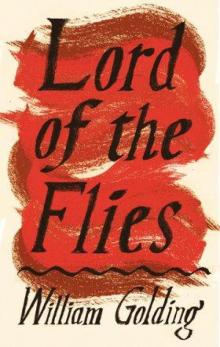 Lord of the Flies
Lord of the Flies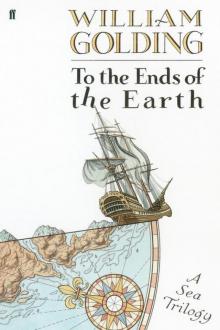 To the Ends of the Earth
To the Ends of the Earth Free Fall
Free Fall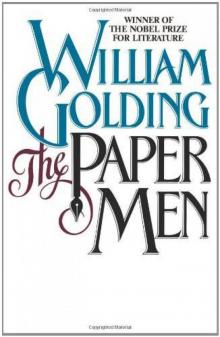 The Paper Men
The Paper Men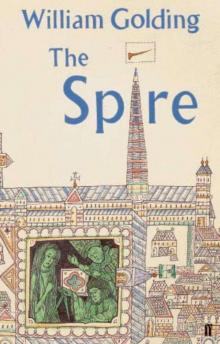 The Spire
The Spire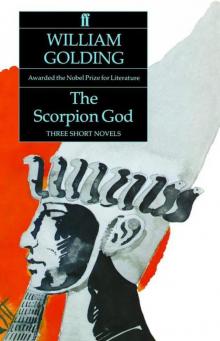 The Scorpion God: Three Short Novels
The Scorpion God: Three Short Novels The Inheritors
The Inheritors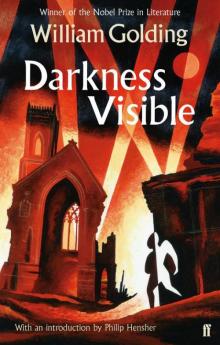 Darkness Visible: With an Introduction by Philip Hensher
Darkness Visible: With an Introduction by Philip Hensher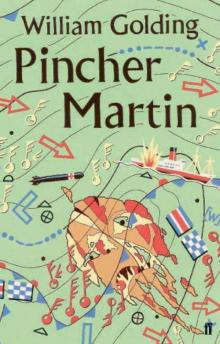 Pincher Martin
Pincher Martin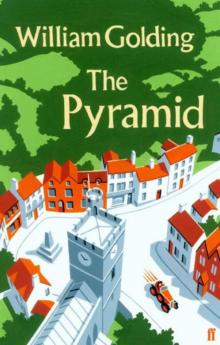 The Pyramid
The Pyramid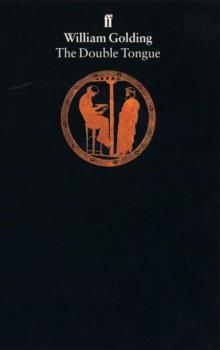 The Double Tongue
The Double Tongue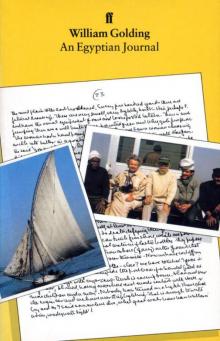 An Egyptian Journal
An Egyptian Journal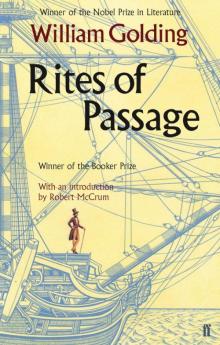 Rites of Passage
Rites of Passage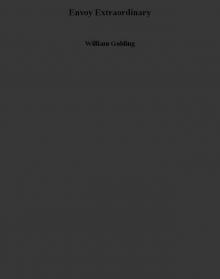 Envoy Extraordinary
Envoy Extraordinary